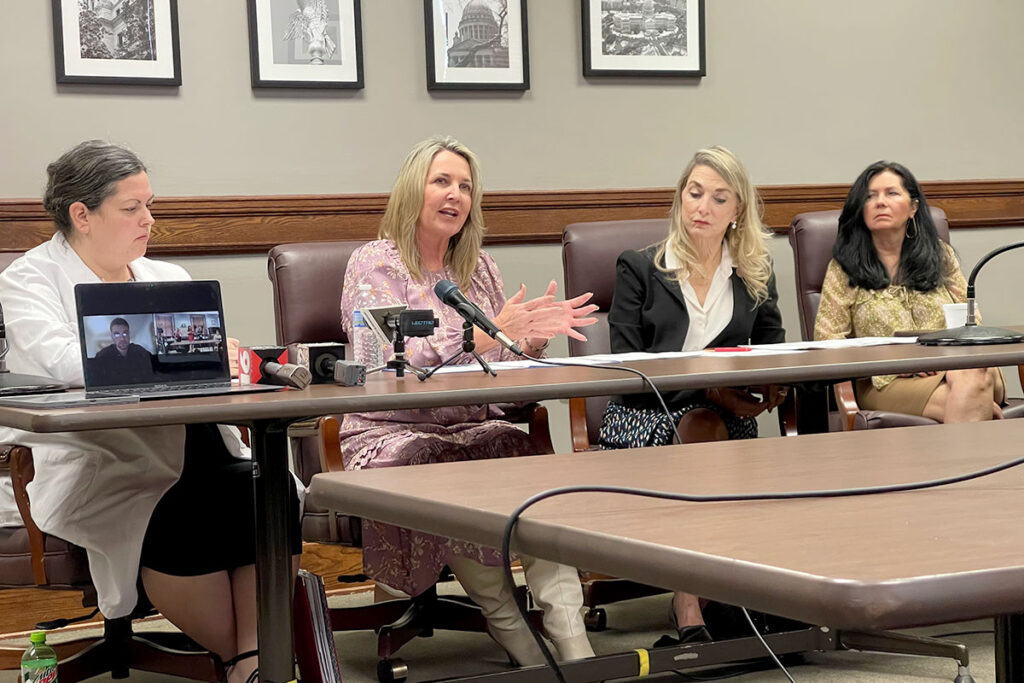Rape victims in Mississippi often wait years before officials test rape kits that could identify their attackers with some even stashed in the trunks of law-enforcement vehicles, but state lawmakers could change that this year. The Mississippi Legislature may also close decades-only spousal rape loopholes in state law.
At the Mississippi Capitol, Mississippi Center for Violence Prevention Executive Director Sandy Middleton said she spoke with an unnamed law-enforcement officer who currently has 50 untested rape kits in a refrigerator, “and some of them have been there for a year and a half.” Of those 50 kits, about 15 are related to child-rape cases, she said during a Feb. 21 press briefing.
In 2019, the Jackson Police Department said it alone had more than 600 untested sexual abuse and rape kits, some a decade old at the time. State law currently does not require agencies to test the kits.
But advocates say that House Bill 485, which is currently making its way through the Mississippi Legislature, could remedy the problem of long-unprocessed rape kits.
It would require a medical facility conducting forensic examination and preparing the sexual-assault evidence collection kit to inform a law enforcement agency for retrieval within four hours. Then, after receiving a call from a medical facility, the law enforcement agency would have 24 hours to obtain the kit, with the option to refrigerate it within two hours or to transport it immediately to the Mississippi Forensics Laboratory.
“All kits must be delivered to the Mississippi Forensics Laboratory no later than seven (7) calendar days from the date the law enforcement agency took physical possession of 73 the kit,” the bill states. “The Mississippi Forensics Laboratory shall test sexual assault evidence collection kits within forty-five (45) days of receipt from a law enforcement agency.”
Rep. Angela Cockerham, I-Magnolia, is sponsoring it, with Reps. Dana McLean, R-Columbus; Jill Ford, R-Madison; and Otis Anthony, D-Indianola, serving as co-sponsors.
The Mississippi House advanced H.B. 485 in a 117-0 vote on Feb. 2, and the Mississippi Senate Judiciary Division A Committee advanced it to the Senate floor on Feb. 28 where it awaits a vote before a legislative deadline Wednesday.
‘Mississippi Has A Backlog, But It’s Not At The Crime Lab’
In an op-ed for The Daily Journal today, Mississippi Attorney General Lynn Fitch urged senators to pass H.B. 485 before the March 8 deadline so it does not die on the calendar. “It would be a great disservice to these victims to let this happen,” she wrote.

Joyful Heart Foundation Policy Implementation Associate Mateo Cello participated virtually in the Feb. 21 press briefing. He said that if H.B. 485 becomes law, Mississippi will join 36 other states that have a rape-kit processing timeline.
“Currently, in Mississippi, there are no statewide rules that dictate how rape kits should be tested and when they should be tested,” Cello said. “H.B. 485 is important because it’s going to put these rape kit handling timelines into place, just as 36 other states in the country have done.
“When tested, rape kits can identify unknown offenders, they can exonerate the wrongfully accused, and they can link crimes together, identifying serial rapists.”
The legislation would give sexual-assault victims the right to ask the law enforcement agency investigating the sexual assault case for information on it.
“The law enforcement agency shall respond to the victim’s request as soon as possible, but no longer than seven (7) calendar days, with either an oral or written communication, or by email, if an email address is available,” H.B. 485 says.
Director Sandy Middleton said the Mississippi Center for Violence Prevention established a clinic in Pearl, Miss., to better serve sexual-assault victims.
“We opened the Bridge Forensic Clinic, which is under the leadership of nurse practitioner Beth McCord, in 2018, because we were having a hard time finding sexual-assault victims and interacting with them. And so we decided the best thing to do was to meet them where they are, which is typically in a hospital,” she said.
“And so the process that we went through is that we went around and worked with our hospitals in the metro area, and we now have five MOUs signed with hospital emergency rooms throughout the metro. … When a victim of sexual assault presents to the ER, they call us, and we send either Beth McCord or one of our other (sexual assault nurse examiners) to do the kit. You know, we’ve done hundreds of kits since we opened.”
“You know, we get asked all the time: ‘What about Mississippi? Does Mississippi have a backlog?’ Well, yes, Mississippi has a backlog, but it’s not at the crime lab. Typically, the kits are either sitting in a hospital, an emergency room refrigerator or they’re sitting in the trunk of a law enforcement investigator, or, you know, they’re somewhere where they’re not being tested.”
Middleton related rape victims’ experiences and said many “lose hope” because they “they don’t even know where their kit is. They don’t even know if the guy’s arrested or the person is arrested, they don’t know anything, and imagine how you would feel if you’d been sexually assaulted or raped, and you didn’t even know who it was.”
Clarifying Spousal Rape Law
At the Feb. 21 Capitol press conference, Rep. Dana McLean also sought support for House Bill 995, which she said would close loopholes on spousal rape. Spousal rape is currently illegal in the state if it involves “forcible penetration against the victim’s will,” but not in instances where a victim is drugged. Her bill would also redefine the law’s definition of rape by not restricting it to a female victim “of previous chaste character.”
“It is to remove the archaic language that we currently have on the books in Mississippi, in which rape is currently defined as to, with intent, forcibly ravish (someone) of previously chaste character,” McLean said. “As we know, that sounds like something from the 1800s, and what the bill does, it repeals that definition and replaces it with the definition that is more consistent with our sexual assault and sexual battery statutes.”
“Also, within the bill, we are removing the spousal defense. Currently, Mississippi is one of just a handful of states that currently has a marital defense on the books, so this would remove that language.”

The current law states: “Every person who shall be convicted of an assault with intent to forcibly ravish any female of previous chaste character shall be punished by imprisonment in the penitentiary for life, or for such shorter time as may be fixed by the jury, or by the court upon the entry of a plea of guilty.”
Middleton wants it to now state: “The penetration, no matter how slight, of the vagina or anus with any body part or object, or oral penetration by a sex organ of another person, whether or not his or her spouse, accomplished (a) against the complaining person’s will, by force, threat or intimidation; or (b) without the consent of the victim; or (c) committed against a person who is physically or mentally helpless or incapacitated.”
The bill’s co-sponsors include William Tracy Arnold, R-Booneville; Lester Carpenter, R-Burnsville; Jerry Darnell, R-Hernando; and Jansen Owen, R- Poplarville. The Mississippi House passed it by a vote of 117-0 on Feb. 9. The Mississippi Senate Judiciary A Committee later advanced it on Feb. 28 to the Senate floor, where senators must pass it by Wednesday’s deadline.










